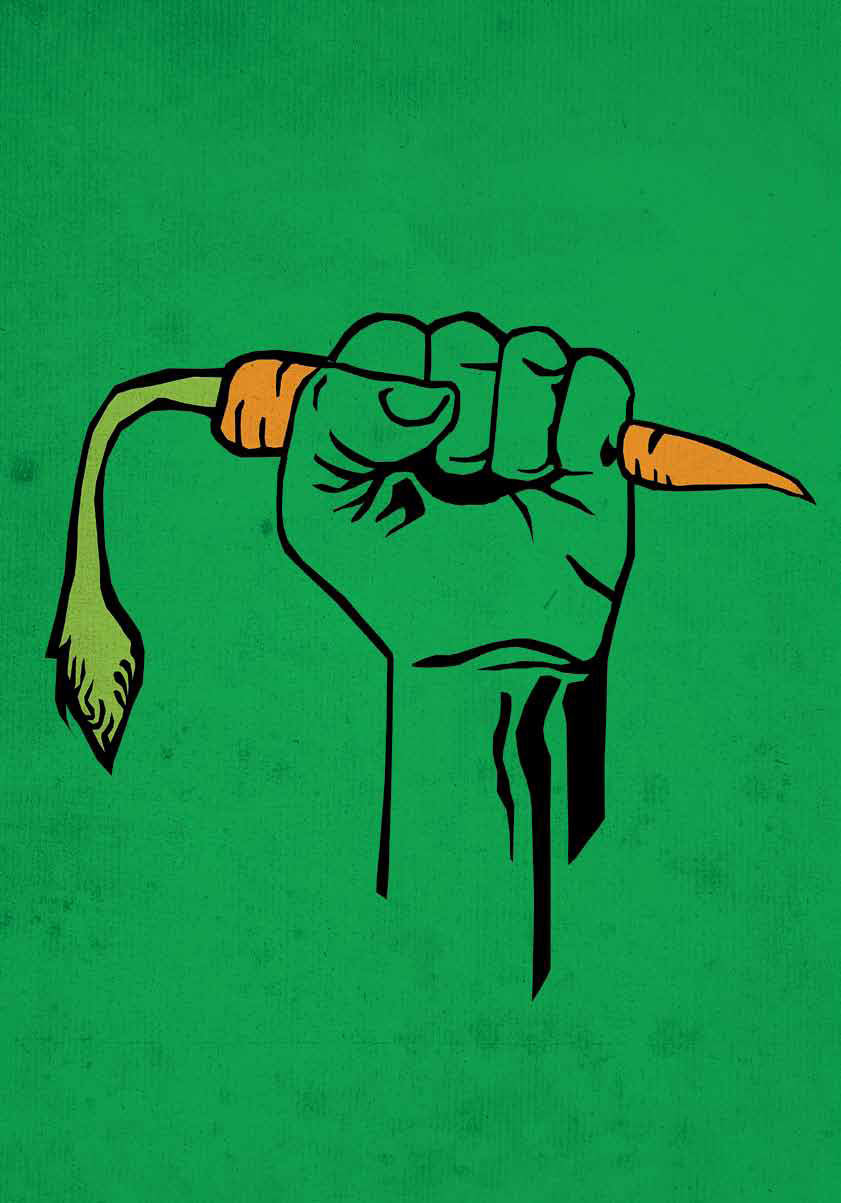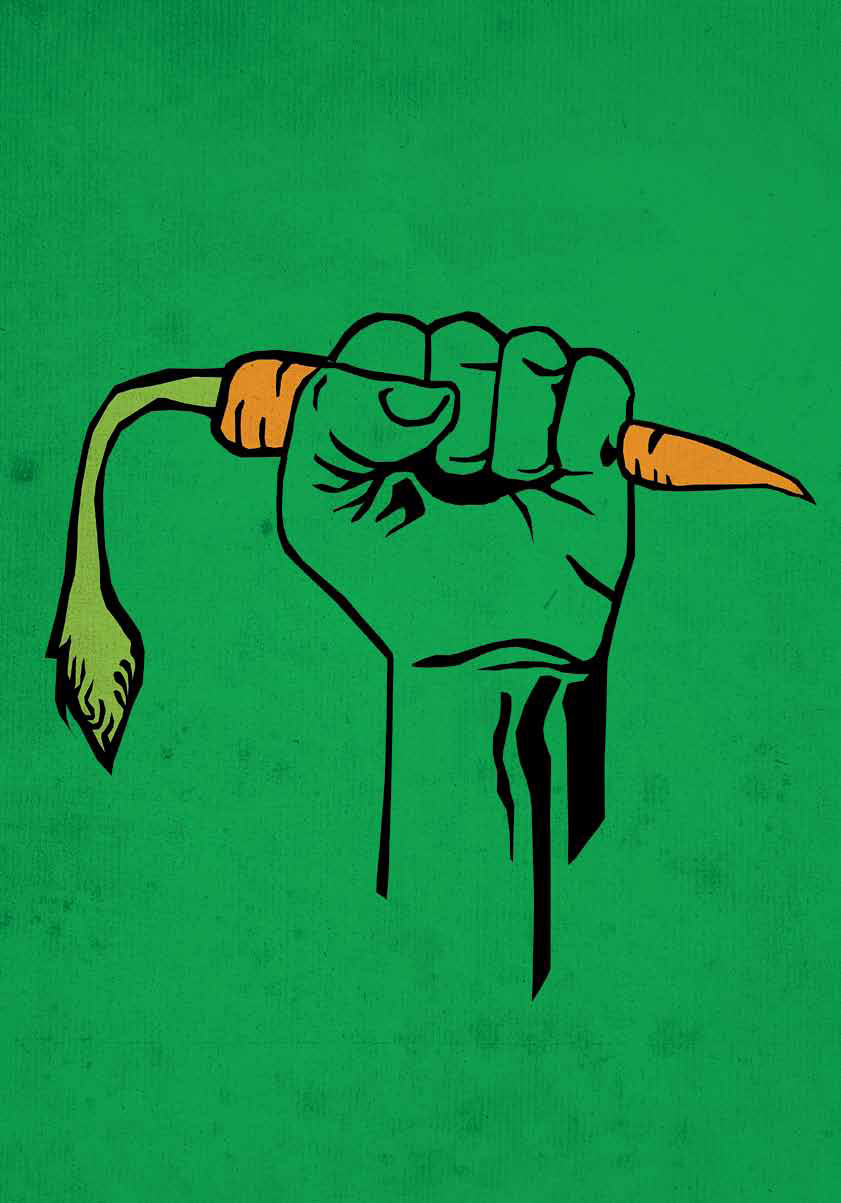 Image: Will Etling’s “Sustain,” originally for GOOD magazine and contributed to Green Patriot Posters. Farmer Bob Comis recently suggested that the food movement is suffering from “multiple personality disorder.” He argued that several vocal factions — foodies, locavores, and “smallists” — tend to dominate the food movement discussion, unrealistically distracting us from our ultimate objective: bringing affordable, organic food to all as part of a broader commitment to social justice.
Image: Will Etling’s “Sustain,” originally for GOOD magazine and contributed to Green Patriot Posters. Farmer Bob Comis recently suggested that the food movement is suffering from “multiple personality disorder.” He argued that several vocal factions — foodies, locavores, and “smallists” — tend to dominate the food movement discussion, unrealistically distracting us from our ultimate objective: bringing affordable, organic food to all as part of a broader commitment to social justice.
For decades now, organic farmers and sustainable food activists of all stripes have been vexed by the question: Is this a movement? Can it scale and have meaningful impact?
At one eloquent and entrepreneurially-impeccably-credentialed end of the spectrum stands farmer Joel Salatin:
Don’t let them confuse you. Organic farming is not an industry. It is a movement. It is part of a movement that began when the first indigenous peoples fought against the Conquistadors. It is fighting back against the modern Conquistadors, the multinational corporations, those who would patent and genetically modify life and destroy diversity.
At the other eloquent and entrepreneurially-impeccably-credentialed end of the spectrum stands Stonyfield Farm CEO Gary Hirshberg: “I hate the ‘m’ word. Organics is an industry. We must build and utilize industrial-scaled enterprises, if we are going to get toxics out of the food chain in one generation.”
There are 6,132 farmers markets in the U.S., up 350 percent since 1994. There were 60 CSAs in 1990; today there are almost 13,000. Some 400,000 people belong to them. That seems movement-ish, until you consider some countervailing data. 50,000 in Copenhagen, alone, belong to a single box scheme. More than 60 million people play Farmville online. McDonald’s first quarter profits in 2011 were $1.21 billion, up 11 percent from Q1 2010. So, despite Food Inc.‘s nomination for an Oscar, Michael Pollan’s single-handed splicing of the local, organic food gene into the American consciousness, and Jamie Oliver’s much ballyhooed Food Revolution on TV, where’s the (grass-fed, organic) beef? Where’s the movement?
The beginning of an answer lies with Paul Hawken, who beautifully argues in Blessed Unrest that it is a fool’s game to try to put a single name on the millions of initiatives emerging around the globe as an immune response to the destruction of natural systems. Add to Hawken’s prognosis Wendell Berry’s disdain for movements. Berry fears that movements, however well-intentioned, devolve into warring special interests, abstractions that deflect us from reducing, in our daily lives, our complicity in the destructiveness of the modern economy.
Where does that leave us?
Well, being stubborn, slogan-loving Americans, we could try to come up with names anyway: Foodie, locavore, vegan, localism, smallism, anti-GMOism, anti-Conquistadorism, anti-Twinkie-ism, raw milkism, school lunchism, ethical treatment of animalism, family farmism, urban farmism, farmers market vs. Walmartism, heirloom variety-ism, real foodism, slow foodism, indigenous culturism, nurture capitalism, biocharism, terroirism.
Or we can zoom out, and zoom down, and look for the broader and deeper process of which all this food related activism is a part. Here are some of the persectives of people who have been working for decades to transform the food system (or create new ones):
Think: Eliot Coleman‘s advice, “Feed the soil, not the plant.”
Think: Gary Snyder’s observation: “Food is the field in which we daily explore our harming of the world.”
Think: Joan Gussow’s aphorism, “I prefer butter to margarine, because I trust cows more than I trust chemists.”
Think: Odessa Piper’s insight, “Local is the distance the heart can travel.”
Along this Coleman-Snyder-Gussow-Piper axis lies the connection between the food movement and its deepest roots, which reach all the way to the nonviolent ethics of Gandhi and King.
This enterprise that we are a part of, with its new organic farmers and the host of small food enterprises that are emerging to bring their produce to market, is about an economy that does less harm. It’s about rebuilding trust and reconnecting to one another and the places where we live. It’s about healing the social and ecological relationships that have been broken by hundreds of years of linear, extractive pursuit of economic growth, industrialization, globalization, and consumerism. It’s about pulling some of our money out of ever-accelerating financial markets and its myriad abstractions — called, with more than a little irony, securities — and putting it to work near where we live, in things that we understand, starting with food — creating a more immediate and tangible kind of security.
This attention to and, even, celebration of the small, the slow and the local can seem, at times, rather precious against the scale of global economic, political, and environmental challenges. But it was agriculture that gave birth to the modern economy, and, as Paul Ehrlich recognizes, it must be agriculture that we fix if there is to be a postmodern economy:
The agricultural revolution led to a period of cultural evolution unprecedented in its rapidity and scale … It is a story that starts with the obtaining of food but returns us to two aspects of human behavior that, although present in hunter-gatherers, became even more important in sedentary groups-religion and violence.
CSAs to the rescue. Local Harvest and Greenling and Green Mountain Creamery and Mamma Chia and Revolution Foods and People’s Grocery and Gather Restaurant and Shepherd’s Way Cheese and High Mowing Organic Seeds and Growing Power and Slow Food and the Business Alliance for Local, Living Economies, and RSF Social Finance to the rescue.
Can we imagine a pro-soil, pro-earthworm, pro-small farmer, anti-fiduciary-razzmatazz, pro non-capitalist-pig movement that becomes as robust in this second decade of the 21st century as the anti-war movement was in the 1960s?
Peace Now. Fertility Now. Food Here Now. Slow Money.




